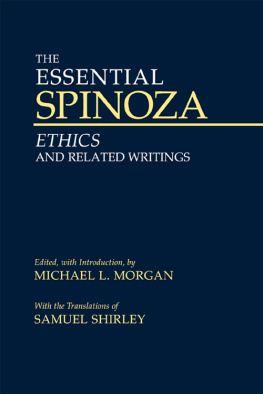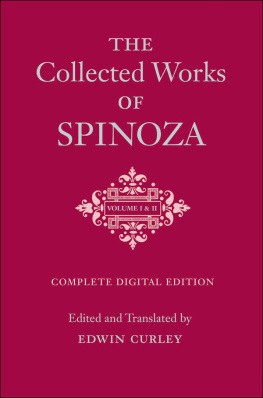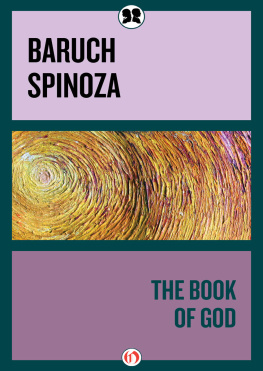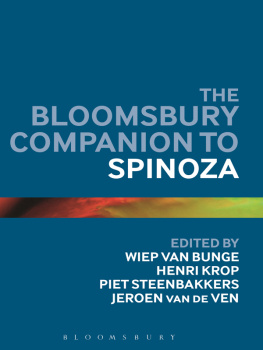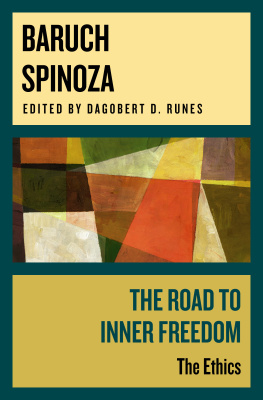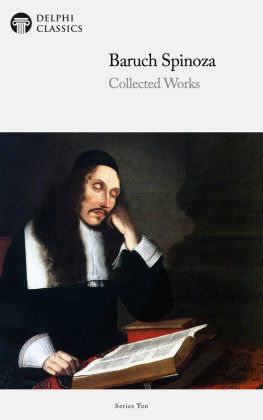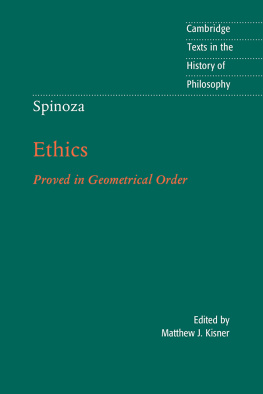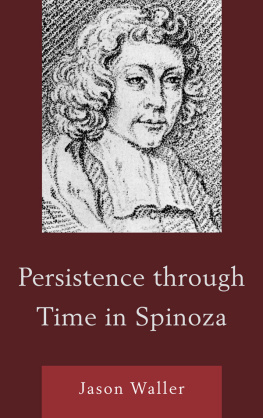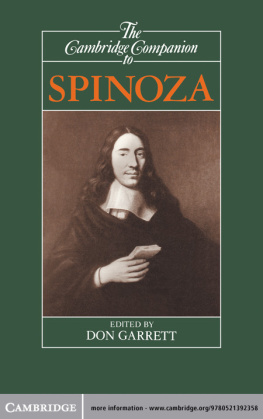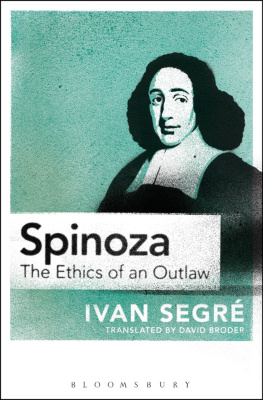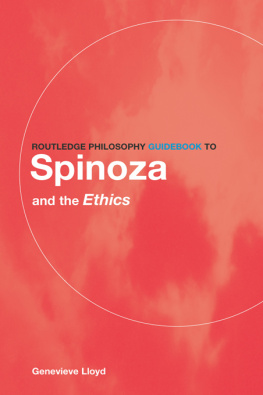Spinoza - The Essential Spinoza: Ethics and Related Writings
Here you can read online Spinoza - The Essential Spinoza: Ethics and Related Writings full text of the book (entire story) in english for free. Download pdf and epub, get meaning, cover and reviews about this ebook. year: 2006, publisher: Hackett Publishing Company, Inc., genre: Religion. Description of the work, (preface) as well as reviews are available. Best literature library LitArk.com created for fans of good reading and offers a wide selection of genres:
Romance novel
Science fiction
Adventure
Detective
Science
History
Home and family
Prose
Art
Politics
Computer
Non-fiction
Religion
Business
Children
Humor
Choose a favorite category and find really read worthwhile books. Enjoy immersion in the world of imagination, feel the emotions of the characters or learn something new for yourself, make an fascinating discovery.
- Book:The Essential Spinoza: Ethics and Related Writings
- Author:
- Publisher:Hackett Publishing Company, Inc.
- Genre:
- Year:2006
- Rating:4 / 5
- Favourites:Add to favourites
- Your mark:
- 80
- 1
- 2
- 3
- 4
- 5
The Essential Spinoza: Ethics and Related Writings: summary, description and annotation
We offer to read an annotation, description, summary or preface (depends on what the author of the book "The Essential Spinoza: Ethics and Related Writings" wrote himself). If you haven't found the necessary information about the book — write in the comments, we will try to find it.
Spinoza: author's other books
Who wrote The Essential Spinoza: Ethics and Related Writings? Find out the surname, the name of the author of the book and a list of all author's works by series.
The Essential Spinoza: Ethics and Related Writings — read online for free the complete book (whole text) full work
Below is the text of the book, divided by pages. System saving the place of the last page read, allows you to conveniently read the book "The Essential Spinoza: Ethics and Related Writings" online for free, without having to search again every time where you left off. Put a bookmark, and you can go to the page where you finished reading at any time.
Font size:
Interval:
Bookmark:
Edited by Michael L. Morgan
With the Translations of Samuel Shirley
Hackett Publishing Company, Inc.
Indianapolis/Cambridge
Copyright 2006 by Hackett Publishing Company, Inc.
All rights reserved
Printed in the United States of America
12 11 10 09 08 07 2 3 4 5 6 7
For further information, please address:
Hackett Publishing Company, Inc.
P.O. Box 44937
Indianapolis, IN 462440937
www.hackettpublishing.com
Cover design by Abigail Coyle
Composition by Agnews, Inc.
Printed at Malloy, Inc.
Library of Congress Cataloging-in-Publication Data
Spinoza, Benedictus de, 16321677.
[Selections. English. 2006]
The essential Spinoza : ethics and related writings / edited by
Michael L. Morgan ; with the translations of Samuel Shirley.
p. cm.
Includes bibliographical references.
ISBN 0-87220-804-4 ISBN 0-87220-803-6 (pbk.)
1. Philosophy Early works to 1800. 2. EthicsEarly works to 1800.
I. Morgan, Michael L., 1944 II. Title.
B3958.M67 2006
199.492dc22 2005057432
ISBN-13: 978-0-87220-804-9 (cloth)
ISBN-13: 978-0-87220-803-2 (pbk.)
ePub ISBN: 978-1-62466-423-6
Spinoza, The Letters. Translated by Samuel Shirley, with Introduction and Notes by Steven Barbone, Lee Rice, and Jacob Adler.
Spinoza, Ethics with The Treatise on the Emendation of the Intellect and Selected Letters. Translated by Samuel Shirley, Edited by Seymour Feldman
In studying the works of Spinoza, the reader can be overwhelmed by the sense of abstract rigor and detachment. These characteristics may seem to some readers to be the product of an almost mechanical mental life. But this appearance notwithstanding, I am inclined to ascribe to Spinoza a romantic set of virtues. He is, among thinkers, extraordinarily creative and novel; his thinking is marked by a marvelous intensity and focus; and yet his deepest commitments are to the most embracing unity and sense of comprehensiveness that one can find in the tradition of Western philosophy. In short, Spinozas writings and his thought are marked by a kind of heroism that is not only rare and beautiful: it is even breathtaking.
We are tempted to think that the notion of perspective, or point of view, so crucial to the world of art, was not of importance to philosophy until Kant and German Idealism made it so. Kant, it is said, taught us what metaphysics could and could not accomplish by his confining its investigations to the viewpoint of human experience; he then went on to distinguish between the detached point of view of the scientific inquirer and the engaged point of view of the moral agent. From those beginnings, German Idealism and its twentieth-century legacy made the notion of perspective, or point of view, central to philosophical accounts of human existence and human experience, from Fichte, Schelling, and Kant to Schopenhauer and Nietzsche, to Husserl, Heidegger, and beyond. And with this legacy came a series of strugglesbetween the natural and the human sciences, between existentialism and scientific philosophy, and between relativism and objectivism.
But perspective was at the center of Spinozas system. His thinking reveals a passion for unity and totality, which is coupled with a scrupulous fidelity to the integrity of the individual particular. There is no parochialism in Spinoza. His commitment to the progress of scientific inquiry into the natural world belied any such limitation in behalf of his cognitive goals. In every way, in every dimension of our lives, Spinoza saw the common; likewise, he saw unity and wholeness. But at the same time, his allegiance to the universality of the ethical life and of its virtues did not annul the personal perspective of human experience. For him, life was always our human struggle against our finite limitations of perspective and particularity. Life was not life without such limitations, but neither could life be what it might be if we were satisfied with them. The world, of necessity, was filled with particular objects, but they existed within a single order. We are among those objects, and our goal is to do what we can, in knowledge and conduct, to live with our particularity and yet to transcend it. Spinoza was fully aware of both the necessity and the complexity of human perspective; he knew what that perspective meant to the hopes for scientific knowledge; for the burdens of religious, moral, and political conflict; and for the possibility of a truly blessed life. In a certain sense, perspective is the fulcrum on which all of Spinozas thinking turns.
{vii} Spinoza lived in a world distant from our own. No amount of historical detail and reconstruction can adequately place us in the complex world of Western Europe in the seventeenth century. So much was new, yet so much was old. And Spinoza was immersed in all that complexity, in a world that was, by virtue of its economic and geographical situation, at a crossroads. Spinoza knew about religious orthodoxies and religious reform; about traditional culture and novelties; about old texts and new thinking; and about the tensions between conservative political practice and liberal hopes and aspirations. And he knew about the risks. To him, reason in humans was akin to reason in nature; one order permeated everything and enabled us, as rational beings, to understand ourselves and the whole, and so to live peacefully and calmly within that whole. This one order was the key to science, ethics, and religion. In fact, it was the key to all of life. It was Spinozas goal to show it, clarify it, explain it, and teach it, to the benefit of all humankind.
But if the key that unlocked the secrets of possibility for us as human beings was unity and totalitythe wholeness and order of all thingsthe reality that grounded the aspiration to this unity and order was the fact that each of us, as natural objects and human beings, was located precisely in that unity and order, which was determined in every way and thereby endowed with a very particular point of view on the whole. In a letter to Henry Oldenburg of November 1665 (Ep32), as Spinoza attempts to clarify the nature of parts and wholes, he provides us with a famous image of this fact. He tells us that each of us is like a little worm in the blood. Nature is like the entire circulatory system or the entire organism; each of us lives within that system or organism, interacting with only a small part of it and experiencing only a very limited region. Even if we grasp the fact that there is a total system and even if we understand its principles to some degree, our experience is so circumscribed and narrow that we are bound to make mistakes about our understanding of the system and our place in it. Myopia confines our understanding, no matter how we seek to overcome it. Yet we do: we aspire to experience every detail, every event, and every item as part of the whole, to see it from the perspective of the whole rather than from our own narrow point of view. Our success is limited, however. We can free ourselves from prejudices and blindness, but only to a degree. Also, we can see ourselves and act in terms of the whole, but only within limits. Our goal is to free ourselves from the distortions and corruptions of our finitudeto become free, active, and rational. These goals are all the same, to become like the whole, which is what tradition dignifies with the title God or divine or the Highest Good.
I do not believe that Spinoza saw this challenge and sort of life as an escape from the world. History was riddled not only with strife and conflict but also with prejudice and persecution. Life certainly could be betterit could be in harmony with nature rather than in a struggle with it. Religious and political institutions could be renovated to serve human purposes, and human life could be refashioned as well. The ancient Stoics had understood that life in harmony with nature was the best human life and that in order to achieve such harmony, one had to understand nature. Natural philosophy or science was both the highest achievement of human rationality and the key to living the best human life. Spinoza, I believe, {viii} fully sympathized with the broad strokes of this program. Like the Stoics, he revered reason and our rational capacities. And also like the Stoics, he saw the reason in us and the reason in nature as intimately linked. Finally, he saw natural philosophy as the key to opening the door of the highest good and the way through that door as leading to tranquility of spirit, harmony with nature, and peace. To be sure, Spinoza was a modern. Natural philosophy included the developments and achievements of the new science, which was conducted in the spirit of Descartes and others, and which was grounded in mathematics and a priori reasoning about natural events and causal relations. But if the science was modern and mathematical and if the metaphysics was constructed as a foundation for that science, the overall role for it and its goals were very similar to those of the ancient Stoics: union with the whole of nature through knowledge of the natural order.
Font size:
Interval:
Bookmark:
Similar books «The Essential Spinoza: Ethics and Related Writings»
Look at similar books to The Essential Spinoza: Ethics and Related Writings. We have selected literature similar in name and meaning in the hope of providing readers with more options to find new, interesting, not yet read works.
Discussion, reviews of the book The Essential Spinoza: Ethics and Related Writings and just readers' own opinions. Leave your comments, write what you think about the work, its meaning or the main characters. Specify what exactly you liked and what you didn't like, and why you think so.

